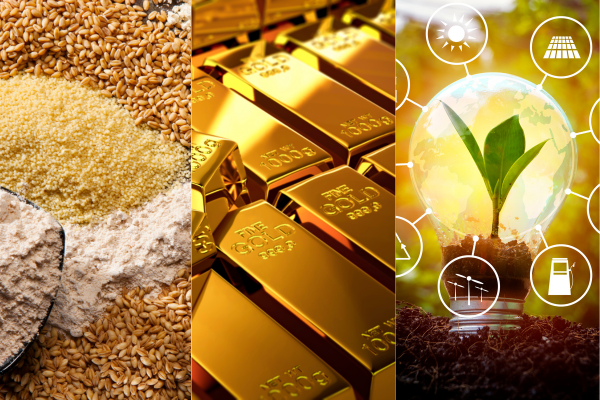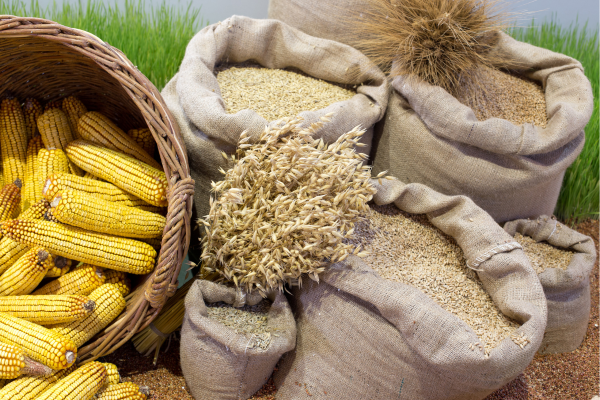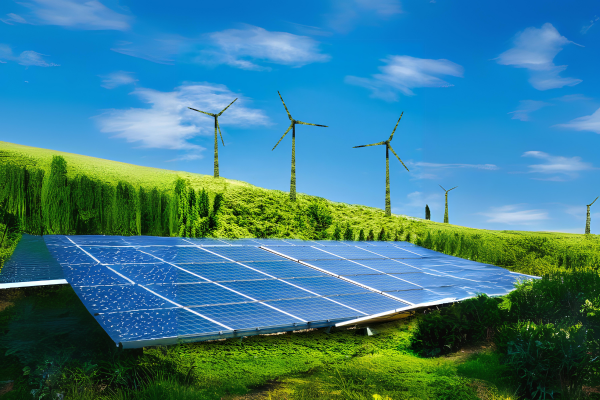Major Commodities You Can Trade
Published: June 05, 2024

In its literal form, commodities are raw materials that manufacturing companies use to produce finished goods. This includes agricultural products, fossil fuels, and soft and hard metals.
But let's look at the financial market.
Commodities are both physical and financial assets because an investor can speculate on their future price by owning a physical form or futures contract of these commodities.
When investors invest in future commodities, they don't necessarily have to own a commodity, such as gold. The trader simply agrees with the counterparty of the trader (buyer or seller) signified by a contract.
Lesson Highlights:
- Aside from their integral role in the manufacturing industry, commodities are also essential for investors and traders due to their speculative opportunities.
- The major commodities traded in the financial market are precious metals (gold, silver), agricultural products (wheat, corn), and energy products (coil, electricity).
Precious Metal
Precious metals have a big role in the commodity markets due to their high economic value, resulting in an influx of investors wanting to grow their capital by trading these rare metals.But what makes these metals so rare and valuable? We'll their value is highly driven by their financial and economic implications, including these reasons:
- The scarcity of these metals
- Their utility beyond industrial uses
- Their ability to hedge against currency inflation
- Their store of value status
Regardless of the critics, their reigning status in the global economy and financial market makes precious metal trading profitable for most commodity traders.
Here is the list of precious metals you can trade today:
- Gold
- Silver
- Palladium
- Platinum

Agricultural Products
Aside from being integral to global food production, agricultural products like corn, wheat, grains, and livestock are also essential to online trading. These farm products are among the commonly traded assets in the commodity market.The commodity market value of agricultural products greatly relies on climatological events and production cycles, along with supply and demand dynamics.
But why, really? Well, here's the reason why these factors move the agricultural products market.
- Supply and Demand: Unlike precious metals, the supply and demand of agricultural products fluctuate and influence the market value of these products.
- Production Cycle: Agricultural products are subject to natural production cycles. These cycles include planting, growing, harvesting, and processing, and each stage of this cycle is significant to the market dynamic.
- Climatological Events: Weather and climatic events are crucial in agricultural markets. Droughts, floods, and other adverse conditions can damage crops, leading to decreased supply. Meanwhile, favorable weather conditions offer stability and may increase the supply of these agricultural products.
Aside from you (trader), brokers, and other investors, the farmers are the primary participants and the unsung heroes in the agricultural commodities market.
Farmers are the backbone of the market as they're responsible for maintaining the smooth circulation of these products. Without them, agricultural commodity traders won't be able to participate in a liquid market.

Energy
The significance of energy products like coil and electricity goes beyond our civilization and everyday lives. These products are also integral to investors trying to establish and maintain financial security.The value of these energy products fluctuates abruptly, and the fluctuation happens frequently. This provides energy traders with profitable opportunities for their trade positions.
However, while trading these commodities is lucrative, you must be mindful of their complex nature.
When you trade these energy products, you need to have a deep understanding of not only the commodities themselves but also the associated political and economic landscape.
Why?
Energy markets are deeply intertwined with the political and economic landscape on both a domestic and global scale. Policy decisions, regulatory frameworks, and international agreements can have profound effects on energy markets.
For instance, government policies related to energy production, environmental regulations, or subsidies for renewable energy sources can impact the supply and demand dynamics of energy commodities.
Moreover, trade agreements, sanctions, and geopolitical tensions between nations can disrupt energy supply chains and influence market prices.
The Best Commodity to Trade
Thinking about which commodity to trade today? Here are the most traded commodities in the market, along with their respective key characteristics.| Commodity | Key Characteristics |
| Crude Oil (WTI and Brent) | High liquidity and volatility Heavily influenced by geopolitical events Closely tied to the global economic conditions |
| Gold | Safe-haven asset High liquidity but less volatile Heavily influenced by the US dollar |
| Silver | Cheaper than gold Volatile Heavily influenced by industrial demand |
| Natural Gas | High volatility Seasonal demand variations Heavily sensitive to climatological events |
| Copper | Strong indicator for global economic health Volatile Heavily influenced by industrial demand |
Remember, choose a commodity you are knowledgeable about or willing to research thoroughly. Understanding the underlying factors that influence price movements can improve your trading decisions.
Always keep in mind that while a highly volatile market provides more trading opportunities, it poses increased risk because of the fluctuations.
Commodities Lesson Outline

- Lesson 1: A Guide to Commodity Trading
- Lesson 2: How Commodity Trading Works
- Lesson 3: Major Commodities You Can Trade
- Lesson 4: Commodity Markets: Spot vs. Futures
- Lesson 5: The Importance of Gold to Online Trading
